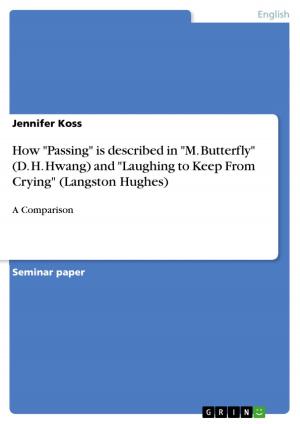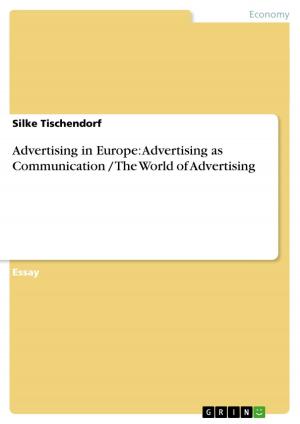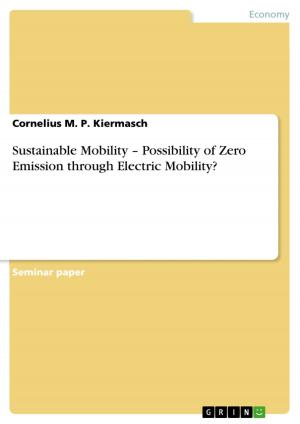The Creole Woman and the Problem of Agency in Charlotte Bronte's 'Jane Eyre' and Jean Rhys's 'Wide Sargasso Sea'
Fiction & Literature, Anthologies| Author: | Rositsa Kronast | ISBN: | 9783640584017 |
| Publisher: | GRIN Publishing | Publication: | April 1, 2010 |
| Imprint: | GRIN Publishing | Language: | English |
| Author: | Rositsa Kronast |
| ISBN: | 9783640584017 |
| Publisher: | GRIN Publishing |
| Publication: | April 1, 2010 |
| Imprint: | GRIN Publishing |
| Language: | English |
Seminar paper from the year 2009 in the subject English Language and Literature Studies - Comparative Literature, grade: 1,3, LMU Munich (Department für Anglistik und Amerikanistik), course: HS Travel and Migration in the Postcolonial World, language: English, abstract: Agency is one of the buzzwords in contemporary critical theory. Referring to the ability of the individual to perform an action, the term agency puts on the theoretical agenda the question of whether one could autonomously act, or whether one's actions are mere consequences of the ways in which one's identity has been constructed (See Ashcroft 2004, 8). Since agency focuses on the secular interrelations between an individual and the society, the term becomes crucial for the theoretical debates on identity formation. Apart from (re-)defining identity as impure, unfixed, fractured and fragmented, Stuart Hall refers in 'Who needs Identity?' to Althusser, Lacan and Foucault in order to elaborate on the ways in which ideology, language and discourse hinder one's ability to initiate an action autonomously. (Hall 1996, 1-17) The notion that our actions are already 'chosen' for us troubles agency. Judith Butler provides a possible solution to the problem by situating identity in the context of gender and viewing gendered identity as constructed through the repetition of the same performance, whereby 'this repetition is at once a reenactment and reexperiencing of a set of meanings already socially established'. (Butler 1990, 140) Due to the changing cultural contexts, one cannot repeat anything twice in exactly the same way. Agency, 'then, is to be located within the possibility of a variation on that repetition'. (Butler 1990, 145) Since my paper deals with Feminist Postcolonial Studies, I would like to use the term agency as the ability of the female colonial Other to act against patriarchy, imperial ideology and Western feminism. Applying agency to the context of Charlotte Brontë's Jane Eyre and Jean Rhys's Wide Sargasso Sea, I demonstrate the Creole woman's loss of a speaking position and the impossibility of retrieving her voice. The aim of my introduction is to elaborate on the historical and political background that gives an account of how the particular power relation between Jane, a plain English girl, transforming into a self-fashioned woman, and Bertha, the Creole wife of Jane's master, comes to be 'powered'. Since Victorian 'women influence the public domain only in relationship to men', as daughters, mothers, and wives, being a woman and an autonomous social agent at the same time is a logical impossibility.(Sharpe 1997, 47) ...
Seminar paper from the year 2009 in the subject English Language and Literature Studies - Comparative Literature, grade: 1,3, LMU Munich (Department für Anglistik und Amerikanistik), course: HS Travel and Migration in the Postcolonial World, language: English, abstract: Agency is one of the buzzwords in contemporary critical theory. Referring to the ability of the individual to perform an action, the term agency puts on the theoretical agenda the question of whether one could autonomously act, or whether one's actions are mere consequences of the ways in which one's identity has been constructed (See Ashcroft 2004, 8). Since agency focuses on the secular interrelations between an individual and the society, the term becomes crucial for the theoretical debates on identity formation. Apart from (re-)defining identity as impure, unfixed, fractured and fragmented, Stuart Hall refers in 'Who needs Identity?' to Althusser, Lacan and Foucault in order to elaborate on the ways in which ideology, language and discourse hinder one's ability to initiate an action autonomously. (Hall 1996, 1-17) The notion that our actions are already 'chosen' for us troubles agency. Judith Butler provides a possible solution to the problem by situating identity in the context of gender and viewing gendered identity as constructed through the repetition of the same performance, whereby 'this repetition is at once a reenactment and reexperiencing of a set of meanings already socially established'. (Butler 1990, 140) Due to the changing cultural contexts, one cannot repeat anything twice in exactly the same way. Agency, 'then, is to be located within the possibility of a variation on that repetition'. (Butler 1990, 145) Since my paper deals with Feminist Postcolonial Studies, I would like to use the term agency as the ability of the female colonial Other to act against patriarchy, imperial ideology and Western feminism. Applying agency to the context of Charlotte Brontë's Jane Eyre and Jean Rhys's Wide Sargasso Sea, I demonstrate the Creole woman's loss of a speaking position and the impossibility of retrieving her voice. The aim of my introduction is to elaborate on the historical and political background that gives an account of how the particular power relation between Jane, a plain English girl, transforming into a self-fashioned woman, and Bertha, the Creole wife of Jane's master, comes to be 'powered'. Since Victorian 'women influence the public domain only in relationship to men', as daughters, mothers, and wives, being a woman and an autonomous social agent at the same time is a logical impossibility.(Sharpe 1997, 47) ...















